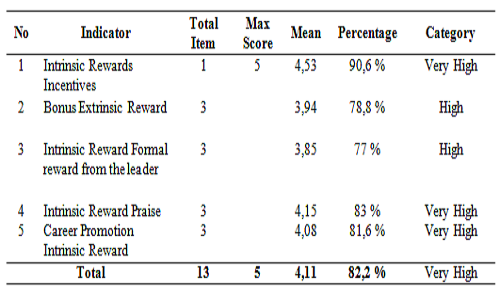
The Influence of Principal Leadership, Rewards and Punishment from Principals on Teacher Discipline in Elementary Schools
Abstract
Keywords
Full Text:
PDFReferences
Amar, S. (2014). Pengaruh Kepemimpinan Kepala Sekolah, Iklim Kerja dan Motivasi Berprestasi Terhadap Disiplin Kerja Guru SMP Negeri 18 Padang. Jurnal Riset Manajemen Bisnis dan Publik, 2(2).
Astuti, A. W., & Sujatna, Y. (2021). Pengaruh Pemberian Reward dan Punishment terhadap Disiplin Kerja Karyawan PT Valve Automation Indonesia. Indonesian Journal of Economics Application (IJEA), 3(1), 75-85.
Bandiyono, A., Hamzah, K. F., & Hidaya, N. A. (2021). Pengaruh Reward Dan Punishment Terhadap Kedisiplinan Pegawai. Jurnal Ekonomi, 26(1), 50-65.
Basuki, K., & Saputra, G. A. (2017). Pengaruh Lingkungan Kerja Dan Sistem Reward Terhadap Kinerja Karyawan Di Moderasi Disiplin Kerja (Studi Pada Pt. Mitra Inovasi Gemilang) Di Jakarta. Media Manajemen Jasa, 4(1).
Cahyaningsih, M. D. (2017). Pengaruh Kepemimpinan Kepala Sekolah Terhadap Disiplin Guru di SMA Negeri 14 Samarinda. Administrasi Negara, 5(1), 5640-5654.
Chairul, A. M., & Kartiani, S. B. (2020). Upaya Kepala Sekolah dalam Meningkatkan Profesionalisme Guru Sekolah Dasar Negeri di Kecamatan Selaparang Kota Mataram. Realita: Jurnal Bimbingan dan Konseling, 2(2).
Dihan, F. N., & Hidayat, F. (2020). Pengaruh Reward dan Punishment terhadap Kinerja Karyawan dengan Disiplin Kerja sebagai Variabel Intervening di Waroeng Spesial Sambal Yogyakarta. JBTI: Jurnal Bisnis: Teori dan Implementasi, 11(1), 11-22.
Gitome, J. W., Katola, M. T., & Nyabwari, B. G. (2013). Correlation between students’ discipline and performance in the Kenya Certificate of Secondary Education. International Journal of Education and Research, 1(8), 1-10.
Hartawan, D. (2017). Dampak Pemberian Punishment Terhadap Disiplin Kerja Karyawan. I-Finance: a Research Journal on Islamic Finance, 3(1), 1-18.
Hasibuan, M. S. (2019). Manajemen Sumber Daya Manusia. Jakarta: Bumi Aksara
Jihan, G. A. (2017). Pengaruh Kepemimpinan Kepala Sekolah dan Lingkungan Kerja Terhadap Disiplin Kerja. Psikoborneo: Jurnal Ilmiah Psikologi, 5(4).
Maulina, M. (2021). Analisis Penerapan Disiplin Kerja Dalam Upaya Meningkatkan Produktivitas Kerja Karyawan Pada Pt. Insan Bonafinde Banjarmasin (Doctoral dissertation, Universitas Islam kalimantan MAB).
Mulyasa, E. (2015). Manajemen dan Kepemimpinan Kepala Sekolah. Jakarta: Bumi Aksara
Mulyasa, E. (2018). Manajemen Berbasis Sekolah. Bandung: Remaja Rosda Karya
Murithi, E. W. (2010). Challenges principals face in enhancing student discipline in secondary schools in Tigania District. Kenya Unpublished Master’s thesis. Chuka University, Kenya.
Nurherdiansyah, M., Priadana, H. S., & Indah, D. Y. (2019). Pengaruh Disiplin Kerja Dan Budaya Organisasi Terhadap Kepuasan Kerja Karyawan (Studi Pada Karyawan Divisi Produksi PT. Industri Telekomunikasi Indonesia (INTI) Persero Bandung) (Doctoral dissertation, Perpustakaan FEB-UNPAS BANDUNG).
Peraturan Pemerintah Nomor 53 Tahun 2010 Tentang Disiplin Pegawai Negeri Sipil
Riduwan, R. (2015). Belajar Mudah Penelitian Untuk Guru-Karyawan dalam Penelitian Pemula. Bandung: Alfabeta
Rifa’i, M. (2018). Pengaruh Kepemimpinan Kepala Sekolah terhadap Disiplin Kerja Guru di SD Negeri 060794 Kecamatan Medan Area. Manajemen Pendidikan dan Keislaman (HIJRI), 42-50.
Rohwiyati, R. (2019). Pengaruh Extrinsic Reward terhadap Kepuasan Kerja Karyawan dengan Motivasi sebagai Variabel Mediasi (Studi pada Karyawan Restoran Mie Gacoan Surakarta). Jurnal Akuntansi dan Manajemen Mutiara Madani, 7(2), 123-139.
Siagian, S. P. (2018). Manajemen Sumber Daya Manusia. Jakarta: Bumi Aksara
Siahaan, R. (2013). Pengaruh reward dan punishment terhadap disiplin kerja karyawan pada PT. Perkebunan Nusantara III Rambutan. Jurnal Ilmiah Bussiness Progress, 1(01), 17-26.
Supardi. (2014). Kinerja Guru. Jakarta: Raja Grafindo Persada
Wahyuni, S., Sabran, S., & Hermanto, M. (2018). Pengaruh Punishment Dan Reward Terhadap Disiplin Kerja Pada Pt. Tri Mandiri Selaras Di Tenggarong. Jurnal Ekonomi dan Bisnis.
Wahyuningrum, S. N., & Sudarso, Y. (2020, November). Pengaruh Lingkungan Kerja Non Fisik, Reward dan Punishment terhadap Disiplin Kerja Karyawan. In Prosiding Seminar Nasional Terapan Riset Inovatif (SENTRINOV) (Vol. 6, No. 2, pp. 164-172).
Yaldi, D., & Ariati, J. (2020). The Effect of Reward, Punishment, Interpersonal Communication and Discipline: Economic Course for Social Students Context. Utamax: Journal of Ultimate Research and Trends in Education, 2(2), 44-49.
Yanti, Y., Zulkarnain, Z., & Gimin, G. (2021). Pengaruh Reward and Punishment dan Motivasi Kerja terhadap Disiplin Kerja Guru di SD Negeri Kecamatan Perhentian Raja Kabupaten Kampar. Instructional Development Journal, 4(1), 44-50.
DOI: http://dx.doi.org/10.31258/jes.6.1.p.128-142
Refbacks
- There are currently no refbacks.
Copyright (c) 2022 SYUHADA SYUHADA

This work is licensed under a Creative Commons Attribution 4.0 International License.
Publisher: FKIP Universitas Riau












